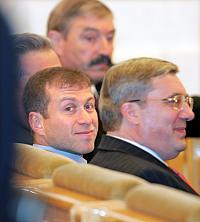 |
|
Igor Tabakov / MT
Roman Abramovich listening
to Putin's speech alongside other governors Wednesday.
|
The state of the nation address Wednesday turned out to be the social event
of the year for the political elite: the place to see and be seen, to rub
elbows with the powerful and then to try to outdo one another in agreeing
with the president.
The lobby of the Kremlin's Marble Hall filled up well before President
Vladimir Putin's speech at noon. Russian Orthodox Patriarch Alexy II sat
in a prime spot next to Prime Minister Mikhail Fradkov. Chukotka's billionaire
governor, Roman Abramovich, took a seat in a section reserved for the
country's 89 regional leaders. Some lawmakers were dripping wet after
parking their cars outside the Kremlin walls and running through a spring
rainshower.
After the address, Finance Minister Alexei Kudrin said Putin's targets
of doubling the economy by 2010, taming inflation and fighting poverty
are within reach.
"Lowering inflation quickly, in one year to 3 percent, is possible,"
Kudrin said.
Doubling GDP earlier than first suggested is also realistic, he said.
"This is a real possibility for us, and I am sure we will attain
it," he told Interfax.
Governors lauded Putin's goals, while many State Duma deputies said
they were achievable.
Sergei Yastrzhembsky, Putin's envoy to the European Union, called the
address "very liberal" and urged Western leaders to pay heed.
Dmitry Rogozin, leader of the populist-nationalist Rodina faction in
the Duma, said the speech represents a Kremlin shift toward Rodina's social
values. Putin, he said, "senses a possible change in the political
environment by the next elections," Interfax reported.
Of those in attendance, the most critical comments came from Communist
Party leader Gennady Zuganov. Putin addressed "the right issues of
improving health and education systems and developing housing construction,
but he did not say how to achieve those [goals]," he told reporters.
Zyuganov also disagreed with Putin's assessment that the lives of most
Russians have improved over the last four years. "Nearly 70 percent
of Russians live near or below the poverty line," he said.
Yabloko co-leader Sergei Mitrokhin,
whose liberal party failed to get into the Duma in December's elections
and, as such, was not invited to the address this year, said Putin's remarks
were little different from previous years.
"It's a repetition of an old story," Mitrokhin said by telephone.
"The president says the right things about poverty, health, education
and housing, and the government ends up doing the opposite. I would describe
it as a boring repetition of previous presidential addresses."
The address won praise from Putin's predecessors, Boris Yeltsin and
Mikhail Gorbachev.
Yeltsin closely watched the speech on television and called it "the
strongest in recent years," his aide Vladimir Shevchenko told Interfax.
Gorbachev said, "My evaluation of the president's speech is extremely
positive," Interfax reported.
While praise ran high in the Marble Hall, not everyone in the audience
was eager to comment. Publicity-shy Abramovich was one of the first to
leave the hall, and he tried to rush past the cameras. But a reporter
managed to grab him by the arm and ask whether he had liked the address.
Abramovich merely nodded and frantically continued to make his way through
the crowd.
The contents of the speech were kept under tight wraps -- apparently
leaving some senior officials out of the loop. As Putin was calling for
inflation to be brought down to an annual 3 percent, Central Bank chief
Sergei Ignatiyev announced in Helsinki that the chances of bringing down
inflation from 12 percent last year to 8 to 9 percent are "very high."
But "we are not planning any correction in our targets now,"
Ignatiyev was quoted by Reuters as saying.
See also:
the original at
www.themoscowtimes.com
Human Rights
|